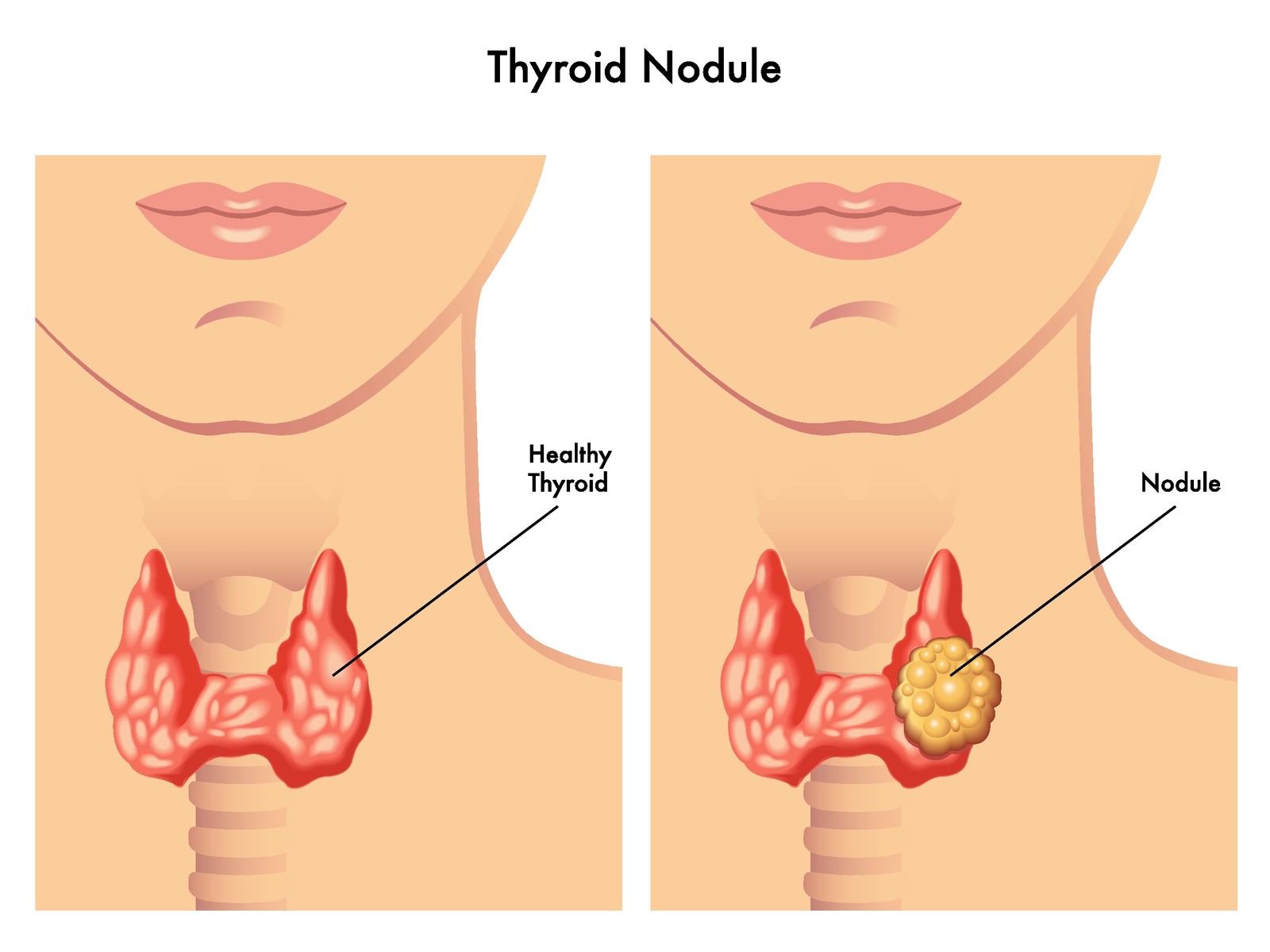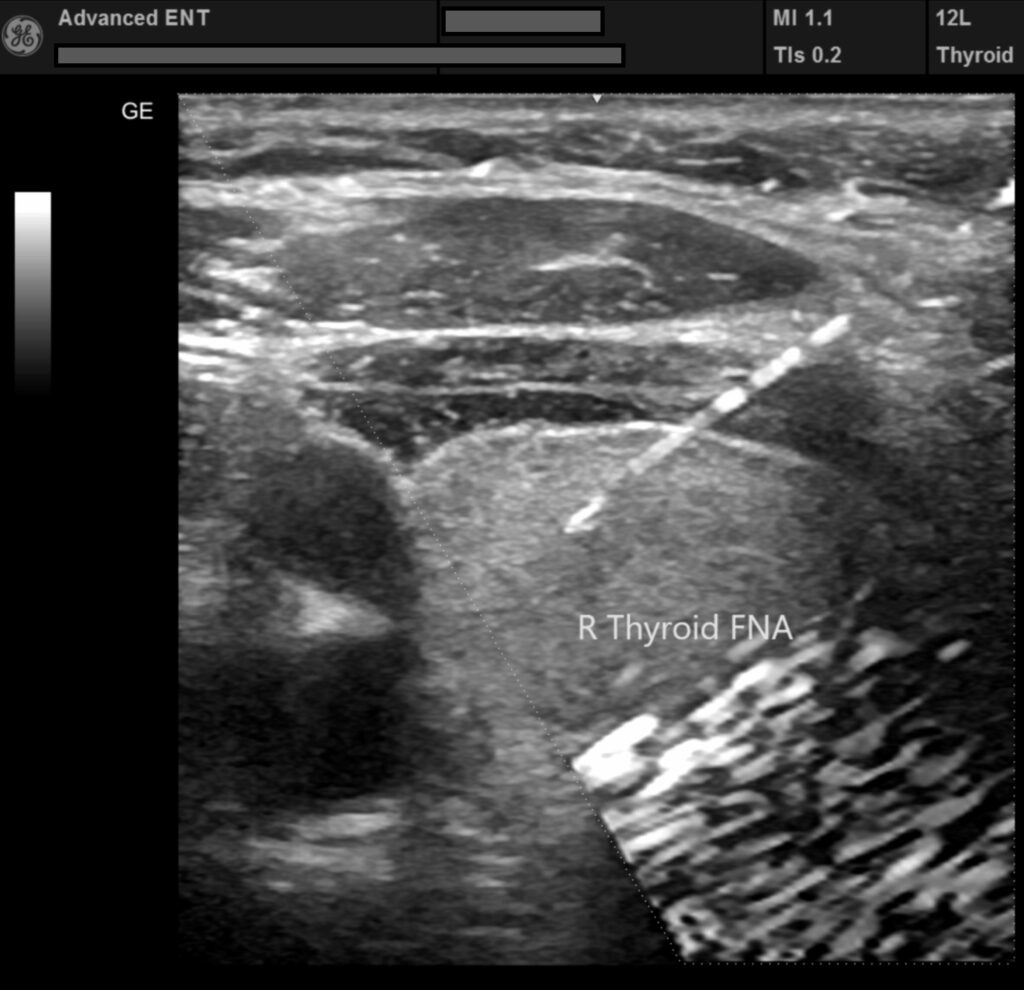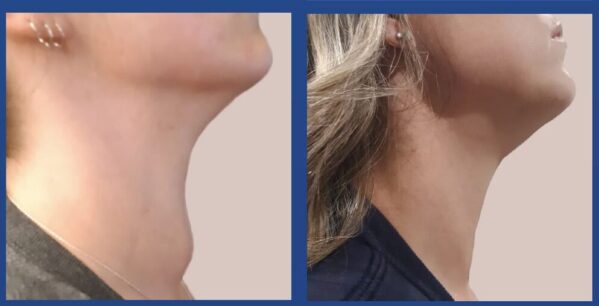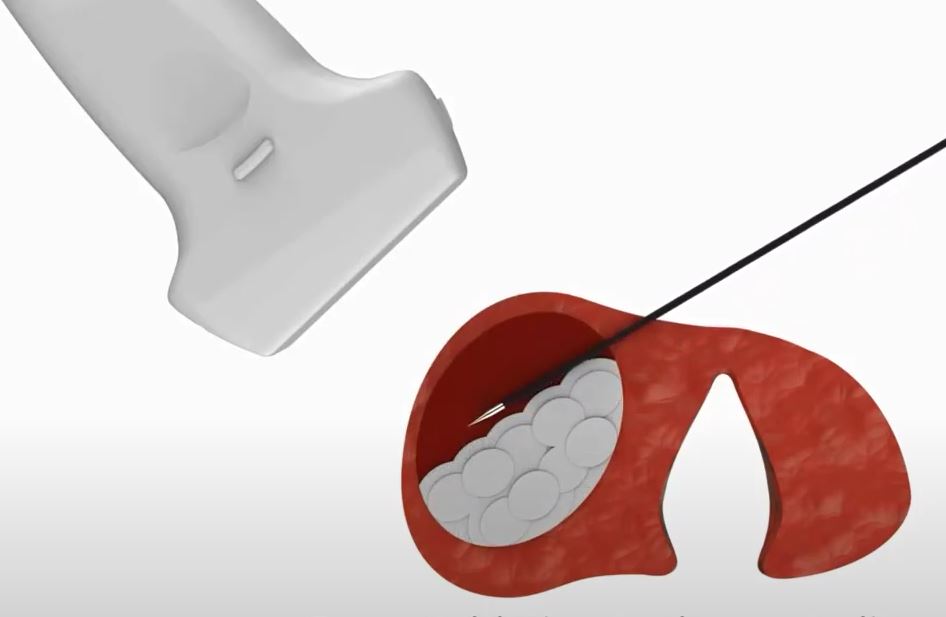What are Thyroid Nodules?

Thyroid nodules are abnormal growths of thyroid gland tissue. This glandular tissue has lost its ability to self regulate and grows larger than its surrounding. Sometimes the nodule is large enough to impact the voice, swallowing function, or cause a visible lump in the neck. About 10% of nodules possess malignant potential, so they must be fully evaluated. Ultrasound is the preferred imaging modality for measurement and characterization of thyroid nodules. Nodules of a certain size or with concerning imaging characteristics are sampled through a technique called “fine needle aspiration.” Bloodwork may be done to evaluate thyroid function. Nodules that are benign may be monitored, ablated, or surgically removed.
Radiofrequency Ablation (RFA) of Thyroid Nodules
Until recently, surgical excision was the only option to remove thyroid nodules. Though surgery is considered safe, it is not without risk to the nerve which controls the vocal cord, or a cosmetically unacceptable incision at the base of the neck. When half of the thyroid gland is removed, approximately 20% of patients will need thyroid supplementation afterwards and unfortunately there is no way to gain back thyroid function after it has been lost.

Radiofrequency ablation (RFA) is a new technique of shrinking thyroid nodules without the risks of surgery. The procedure uses a hand-held electrical device in the office and takes about 45 minutes. This technique is supported by strong evidence for treating symptomatic or visible benign thyroid nodules. The data is also strong for treating toxic (overactive) thyroid nodules and even low risk papillary thyroid carcinomas measuring 1 to 1.5 cm or smaller in size.
The procedure is performed in the office with oral sedative medication and local anesthetic. Over the counter pain medication is all that is needed afterwards for pain control, and there is virtually no downtime from normal activity. Radiofrequency ablation can limit the need for thyroid surgery, which allows patients to keep their thyroid and reduce the risk of needing to take thyroid supplements.
Patients are carefully selected for this procedure. An ideal candidate for RFA has symptomatic or visibly conspicuous benign nodules. Two benign fine needle aspiration biopsies are recommended prior to the procedure. Fine needle aspiration biopsies, supplemented with a molecular marker analysis on indeterminate nodules allow proper candidate selection. A baseline ultrasound done in the office measures the size of the nodule, and is repeated at scheduled intervals to assess the response. Very large nodules may require a second treatment after at least 6 months.

Radiofrequency energy uses very rapidly oscillating electrical current to disrupt the cells and molecules of the nodule. This particular RFA device has a specialized temperature monitoring and cooling system to ensure no collateral injury to surrounding tissue or nerves. RFA procedures have been in use in medicine for decades, but only recently applied to the treatment of thyroid nodules because of this improvement in the technology.
For many patients, thyroid nodule ablation with RFA will eliminate the need for surgery.
For patients travelling to Atlanta for RFA, a local overnight stay after the procedure is recommended.
Check another informational video here: https://www.youtube.com/watch?v=7596FK3_X30.

Insurance Coverage?
Currently, insurance companies are not covering this procedure because it has no specific CPT (Current Procedural Terminology) code. Although there is robust data to support its efficacy and safety, they consider it experimental or investigational and do not guarantee payment. Unfortunately, we must collect payment in advance, but some patients have had success in getting partially reimbursed by their insurance plans. In this case, you would be filing the claim directly to your insurance, as we cannot file this claim on your behalf, lest the insurance company requires us to accept a partial payment as payment in full.
How Can I Schedule Thyroid RFA?
A consultation is required with one of our surgeons to review your case and determine whether you are a good candidate. Prior thyroid biopsy results are most important, and a second biopsy can be performed at the initial consultation if necessary.
Dr. G. Aaron Rogers | Dr. Steven Bomeli | Dr. Sam Mickelson | Dr. Andris Golde
FAQ’s Here!
Surgery is a great answer for many people. However the truth this, about 90% of surgery on the thyroid gland is done for noncancerous growths. Using ablation to eliminate the nodule without surgery will save people a lot of healing time, possible complication, and possible need for thyroid medication. This is an answer for people who have a troublesome noncancerous nodule.
Yes! Our office does hundreds of thyroid and parathyroid surgeries a year. Traditional thyroid surgery is still the most common management for questionable nodules, and we do a lot of it. However, RFA treatment of many nodules will be a game changer. We expect that almost half of thyroid nodules could be safely treated with RF ablation technology.
Radiofrequency ablation is done under local anesthesia. We go to great lengths to numb the neck at the onset of the procedure. Discomfort is minimal during the procedure. Afterwards an ice pack and some nonsteroidal anti-inflammatories are recommended for couple of days. Most patients do not need strong pain medication, and can return to most normal activities.
Many times we are not certain of the exact classification of a thyroid nodule until we have done surgical removal. However the needle biopsy, along with genetic testing, is very good at ruling out cancer. Benign thyroid nodules include follicular and papillary adenoma. There has been some research on RFA of very early low-grade papillary carcinoma, as well as hyperfunctioning nodules (hyperthyroid).
You will meet with a thyroid surgeon for consultation. We absolutely will need to have any prior needle biopsies that you have had done before. If we do not have any we may be getting new needle biopsies done. We aim to be 110% certain that there is no carcinoma or cancer in your thyroid before we do this procedure. We may have to have some thyroid blood work drawn as well. After we ensure you are medically appropriate for the procedure, we can get the procedure set up with our scheduling staff. We usually schedule 60-90 minutes for the treatment visit. Most patients will have a loved one drive them. If you are traveling from out of town, we do recommend spending at least 1 night in the Atlanta area before returning home.
Most insurances are not covering thyroid RFA yet. We require payment up front for the procedure, and our patients can submit to insurance on their own to see if their plan allows full or partial reimbursement. For the most current information related to this, feel free to give us a call!
Scientific Studies on Thyroid Nodule RFA:
- Muhammad, H., Santhanam, P., & Russell, J. O. (2021). Radiofrequency ablation and thyroid nodules: updated systematic review. Endocrine, 72(3), 619–632. https://doi.org/10.1007/s12020-020-02598-6
- Feroci, F., Guagni, T., Coppola, A., Perini, D., Conforti, B., Genzano, C., Belliti, D., Petrucci, A., Sarno, A., & Cantafio, S. (2020). Radiofrequency Thermal Ablation of Benign Thyroid Nodules: The Correlation Between Ultrasound Nodule Characteristics and Results. Surgical innovation, 27(4), 342–351. https://doi.org/10.1177/1553350620913134
- Rangel, L., Volpi, L. M., Stabenow, E., Steck, J. H., Volpi, E., Russell, J. O., & Tufano, R. P. (2020). Radiofrequency for benign and malign thyroid lesions. World journal of otorhinolaryngology – head and neck surgery, 6(3), 188–193. https://doi.org/10.1016/j.wjorl.2020.07.002
- Offi, C., Garberoglio, S., Antonelli, G., Esposito, M. G., Brancaccio, U., Misso, C., D’Ambrosio, E., Pace, D., & Spiezia, S. (2021). The Ablation of Thyroid Nodule’s Afferent Arteries Before Radiofrequency Ablation: Preliminary Data. Frontiers in endocrinology, 11, 565000. https://doi.org/10.3389/fendo.2020.565000
